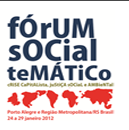The Forum took place under the theme “Capitalist Crisis, Social and Environmental Justice,” and was part of the preparatory process for the “People's Summit in Rio+20." It explored expansion of spaces to experiment with alternative forms of economic cooperation, such as the “social and solidarity economy” and using complementary currencies at various territorial levels.
 February 2012: The Thematic Social Forum on the UN Conference on Sustainable Development (UNCSD, or Rio+20) concluded with alternative visions and strategies to address emerging social and environmental crises, such as defending and expanding the “Commons.” Held under the theme “Capitalist Crisis, Social and Environmental Justice,” the Forum comprised part of the preparatory process for the People’s Summit in Rio+20, which will take place from 15-23 June, in parallel to the UNCSD.
February 2012: The Thematic Social Forum on the UN Conference on Sustainable Development (UNCSD, or Rio+20) concluded with alternative visions and strategies to address emerging social and environmental crises, such as defending and expanding the “Commons.” Held under the theme “Capitalist Crisis, Social and Environmental Justice,” the Forum comprised part of the preparatory process for the People’s Summit in Rio+20, which will take place from 15-23 June, in parallel to the UNCSD.
The Forum gathered from 24-29 January 2012, in Porto Alegre, Brazil. According to the UN Non-Governmental Liaison Service (UN-NGLS), the Forum provided an opportunity for social movements that emerged in 2011, such as the Arab spring and the “indigados” and “occupy” movements, to exchange experiences and explore new ways of working together, both between themselves and with older social movements, such as farmers and indigenous peoples. Various thematic groups – covering water, sustainable cities, finance, alternatives to the green economy, communications and digital culture, and education – sought to converge their analyses, proposals and campaigns, having begun their work through open online platforms prior to the Forum. The thematic groups will continue to develop their work in preparation for the People’s Summit.
During the Forum, many participants, especially developing country participants, were critical of the green economy, viewing the concept as being synonymous with further commodification or financialization of nature. Many workshops discussed expanding spaces to experiment with alternative forms of economic cooperation, such as the “social and solidarity economy” and using complementary currencies.
All the proposals in the texts produced by the various thematic groups have been compiled into a working paper, titled “Another Future is Possible: Come to Reinvent the World at Rio+20.” This working paper organizes the proposals and work done by the different thematic groups into four core themes, as follows: ethical and philosophical foundations – subjectivity, domination, and emancipation; human rights, peoples, territories and defense of Mother Earth; production, distribution and consumption – access to wealth, common goods, and economies of transition; and political subjects, architecture of power and democracy. [UN-NGLS News Release] [Publication: Another Future is Possible: Come to Reinvent the World at Rio+20]